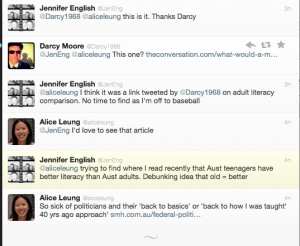After reading a twitter post and link to a Sydney Morning Herald article from Alice Leung, @aliceleung (http://www.smh.com.au/federal-politics/political-news/naplan-testing-disguises-illiteracy-says-labor-mp-20131109-2×833.html) about a back to basics approach to literacy sprouted by Labor backbencher Alannah MacTiernan, it brought to mind an article shared by Darcy Moore, @Darcy1968 (http://theconversation.com/what-would-a-more-literate-world-look-like-18420) on worldwide literacy results. This article briefly made reference to a stat that 17 to 24 year olds in Australia have a better functional literacy than older Australians.
Even though one spoke of NAPLAN and the other International testing the different messages confused me. This set my subconscious whirring and while I went about my mundane Sunday routines my subconscious began to ask me some serious questions. Australia is sitting 4th in the latest rounds of OECD testing for functional literacy as part of its Programme for the International Assessment of Adult Competencies, but what does this mean?
I know from teaching, that class position tells nothing about reaching benchmarks or achieving outcomes. I have an outstanding chemistry class this year. The top 6 students are all operating way above where my top student was last year. Having spent many years swimming, I know that coming first in the heat does not get you a spot in the final. So what does this fourth place mean in terms of our levels of literacy and how does this compare to previous years?
The Australian Bureau of Statistics confirms that older Australians have lower levels of literacy and numeracy than younger Australians. While I am not naïve enough to think that education is the key factor in this statistic. Is it such a long bow to draw to say that literacy and numeracy education have been getting better over time? Perhaps we are doing things better and a ‘back to basics’ approach will lower our standards. I am all for evaluating what we do but let’s not throw the baby out with the bath water.
I felt the only way to validate any claim about rising or falling literacy rates would be to compare the level achieved by each age group over time. In my limited online search, all I could find was a comparison between 1996 and 2006 OECD data on Australian document literacy and age cohorts. Which shows that literacy has improved in all age groups from 1996 to 2006 and that there is a decline in document literacy each year in the older age groups. http://www.pc.gov.au/__data/assets/pdf_file/0014/102029/05-chapter3.pdf
As well as an article by Wayne Sawyer http://www.aate.org.au/files/documents/Literacy%20Crises.pdf on how we cook up literacy crises in Australia, which outlines how we should be more worried about our educational inequities rather than our international ranking and how the media has been blaming teachers about poor literacy since the early 1970s. I think this gets at the core of why those with the lowest literacy in Australia get worse while those with the highest literacy continue to improve. This social inequity is the stat governments should be focusing on rather than blaming teachers.
Is Australia doing better or worse in terms of literacy overall? In my brief search, I could find no proof. Has anyone done a longitudinal study? Shouldn’t this be an important part of our evaluation process? Particularly when both sides of the political spectrum are calling for the ‘back to basics’ approach.
Recent Comments